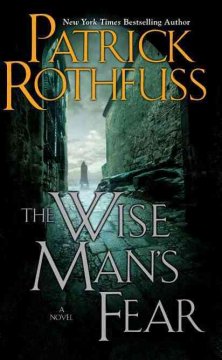
 Patrick Rothfuss's 2007 debut, The Name of the Wind, reaped tons of critical acclaim and landed on the New York Times bestseller list--no small feat for an epic fantasy weighing in at nearly 700 pages--and just recently came in third in a Tor.com poll of the best speculative fiction of the past decade. It was generally considered to be the first volume of a trilogy, which was not an unusual career pattern for a fantasy novelist deemed to have commercial potential. With the publication of the long-awaited followup, The Wise Man's Fear, however, it becomes increasingly clear that what we're dealing with is not strictly speaking a trilogy but a contemporary (and jumbo-sized) variant on the Victorian "triple-decker," a single novel, called The Kingkiller Chronicle, published in three volumes.
Patrick Rothfuss's 2007 debut, The Name of the Wind, reaped tons of critical acclaim and landed on the New York Times bestseller list--no small feat for an epic fantasy weighing in at nearly 700 pages--and just recently came in third in a Tor.com poll of the best speculative fiction of the past decade. It was generally considered to be the first volume of a trilogy, which was not an unusual career pattern for a fantasy novelist deemed to have commercial potential. With the publication of the long-awaited followup, The Wise Man's Fear, however, it becomes increasingly clear that what we're dealing with is not strictly speaking a trilogy but a contemporary (and jumbo-sized) variant on the Victorian "triple-decker," a single novel, called The Kingkiller Chronicle, published in three volumes.
A brief recap, then, may be in order: in The Name of the Wind, readers were introduced to Kvothe the Bloodless, a once-legendary warrior and magician who has assumed a quiet life as the proprietor of a remote inn at the edges of a kingdom in turmoil. Confronted by a traveling scribe, Kvothe agrees to tell his true life story, and flashbacks constituting the bulk of the novel reveal how he grew up in a troupe of Gypsy-like entertainers, was the only survivor when they were slaughtered in the woods, and survived as a homeless boy in the nearest big city for several years before making his way to the University, where he intended to study magic and learn whatever he could about the ancient and powerful figures connected to his family's death. Unfortunately, Kvothe's talents for music and magic are rivaled by his talent for making enemies... and then, after a night of storytelling (and one shockingly violent interruption), Kvothe pauses.
The Wise Man's Fear picks up the very next morning, lingering on the village and its inhabitants for some time. (Readers will quickly intuit that the troubles making their way to Kvothe's inn will eventually be revealed as stemming from something in his past, though the answers will not all come today.) The reminiscences resume with Kvothe's turbulent academic life. Although he makes some powerful magical discoveries, his personal conflicts also become more intense, and he is persuaded to leave campus for a while. He winds up in an aristocratic court, where, in short order, he foils a plot on a nobleman's life and helps said nobleman to woo a wife. For his troubles, Kvothe is assigned a team of mercenaries to track down a band of highwaymen, a mission that offers not one but two detours: first, he is lured into the faerie realm to become the plaything of a seductress; then, after cleverly gaining his freedom, he undergoes training in the martial arts of the Adem. After much adventure, he returns to the University triumphant, and another day of storytelling ends... but we know from the present-day situation that things are likely to turn very bad very soon.
This is all the barest of synopses, and doesn't even begin hint at the rich verisimilitude of Rothfuss's fantasy realm, a setting that is rendered as finely as, say, Jack Vance's Dying Earth stories or George R.R. Martin's A Song of Ice and Fire sequence. The Kingkiller Chronicle is also, fundamentally, a coming-of-age novel with a particular type of protagonist immediately recognizable to speculative fiction readers. Young Kvothe may be immensely talented, and even knows exactly how talented he is, but he lacks much of the discipline necessary to turn that talent into truly accomplished skill, and many is the time he's put in his place for his reckless behavior. (Robert A. Heinlein's Starship Troopers is a classic example of this story type.) Let's put it this way: whenever his friends introduce him to somebody important, they are highly likely to remind him that he needs to be polite, and he's just as likely to wonder why they think they need to tell him this. Rothfuss's narrative framework allows contemporary Kvothe to reflect on his younger self's arrogance and naivete--especially when it comes to women--while gently reinforcing readers' empathy until his maturity rises to match his ambition. By then, of course, they'll be dying to find out what could have happened after all the events Kvothe has already described that would compel him to hide away at the end of the world, "a man waiting to die."--Ron Hogan
Shelf Talker: Patrick Rothfuss has a substantial fan base: The Wise Man's Fear debuted at #1 on the New York Times hardcover fiction list. But new readers should be aware that reading this novel without The Name of the Wind under your belt is like walking into Hamlet in the middle of the third act; you could probably pick the story up contextually, but you're still missing out on a lot.

